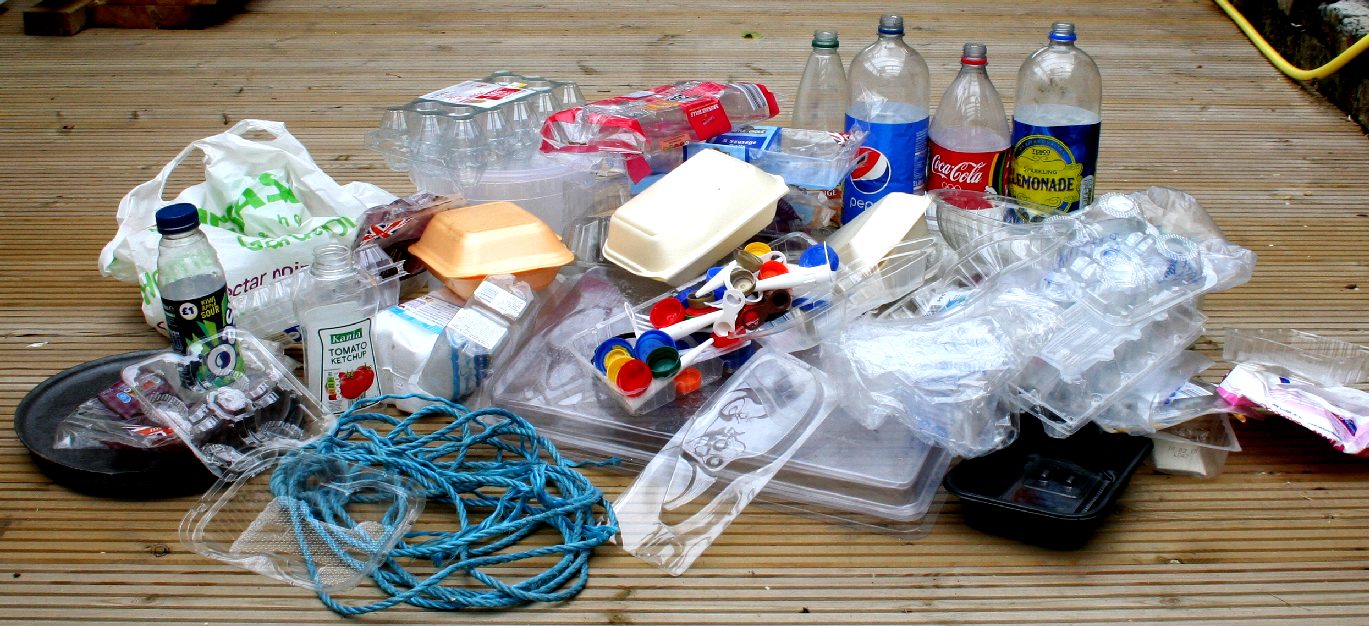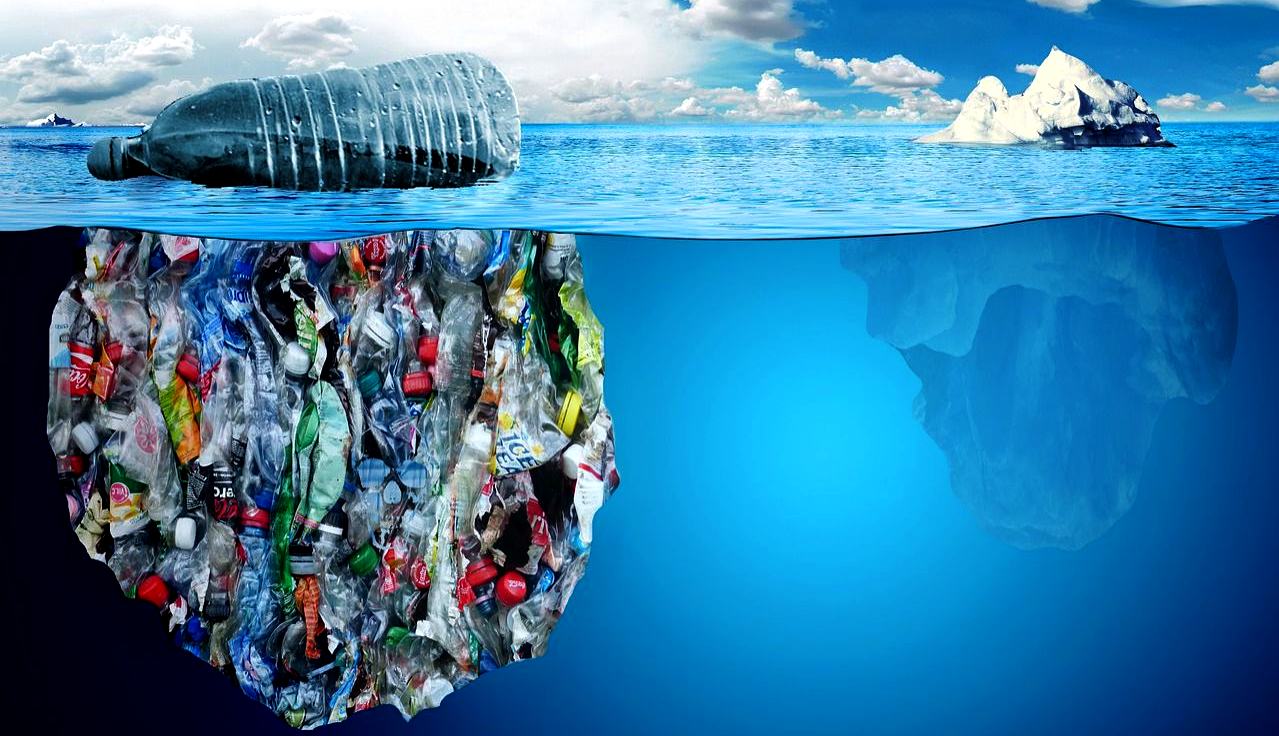|
WASTE
MANAGEMENT WORLD
ABOUT -
CONTACTS - FOUNDATION -
HOME - A-Z INDEX

SINGLE
USE PLASTICS - Not a pretty sight. This is
just a small sample of the plastic packaging that you will
find in retail stores all over the world. Do an experiment the
next time you go shopping. Take the food out of the plastic
packaging and put the food on one side of your table and the
packaging on the other. You will find that the volume is about
the same. This means that for all the food you consume in a
year, the equivalent envelope of plastic needs to be recycled
responsibly.
A good proportion
of this packaging - around 8 millions tons a year, will end up
in our oceans, in the gut of the fish we eat, in the stomachs
of seabirds and in the intestines of whales and other marine
mammals. of course we are the last in the food chain where the
toxins can get us, if the micro plastics
don't. Copyright photograph © 22-7-17 Cleaner
Ocean Foundation Ltd, all rights
In
a modern world, managing waste and effective recycling (or
disposal) is one of the keys to a
sustainable society. Many years ago a pleasure cruiser
capsized on the River
Thames and nobody made it to the river banks because of
the toxic state of the river. This led to sewers and drainage
with treatment plants. Buckets that were thrown into the
streets: "mind your heads," in days gone by were replaced with the
Elsan Closet and finally flushing toilets, care of Thomas
Crapper, a man whose name is synonymous with porcelain bowls
with seats that carry human
waste into the drains, sewers and then out to sea; all of this
fed from a cistern that filled automatically with water from a
piped water supply.
In
some developing countries like India, there are still not
enough flushing toilets and drainage systems to cope with the
human population. Untreated faeces are thrown into their
rivers as a result. With the Ganges
being one of the most polluted rivers in the world as a
result.
The
one thing that is common with the current plastic
epidemic is that the waste ends up in the sea. For centuries
we have thought of the sea as a convenient dumping ground, and
yes it was convenient all the while our population was smaller
and we could feed ourselves without going into the red by
exhausting our food reserves.
This was a time of blue decline, the opposite to blue
growth, where we soiled the ocean without a care. Times
change!
WASTE MANAGEMENT WORLD 24 FEBRUARY 2017
- CELEBRITY BACKING: UN DECLARES WAR ON PLASTIC
UN Environment (UNEP) launched a global campaign to eliminate major sources of marine litter yesterday, including microplastics in cosmetics and the excessive, wasteful usage of single-use plastic by the year 2022.
UN Environment (UNEP) launched a
global campaign to eliminate major sources of marine litter yesterday, including microplastics in cosmetics and the excessive, wasteful usage of single-use plastic by the year 2022.
Launched at the Economist World Ocean Summit in Bali, the #CleanSeas campaign is urging governments to pass plastic reduction policies; targeting industry to
minimise plastic packaging and redesign
products; and calling on consumers to change their throwaway habits before irreversible damage is done to our seas.
"It is past time that we tackle the plastic problem that blights our oceans. Plastic pollution is surfing onto Indonesian beaches, settling onto the ocean floor at the
North
Pole, and rising through the food chain onto our dinner tables, urged Erik Solheim, Head of
UN Environment. Weve stood by too long as the problem has gotten worse. It must stop."
UNEP explained that throughout the year, the #CleanSeas campaign will be announcing ambitious measures by countries and businesses to eliminate microplastics from personal care products, ban or tax
single-use
bags, and dramatically reduce other disposable plastic items.
Ten countries have already joined the campaign with far-reaching pledges to turn the plastic tide. Indonesia has committed to slash its marine litter by a massive 70% by 2025; Uruguay will tax single-use plastic bags later this year and Costa Rica will take measures to dramatically reduce
single-use plastic through better waste management and education.
According to UNEP each year, more than 8 million tonnes of plastic ends up in the oceans, wreaking havoc on marine wildlife,
fisheries and tourism, and costing at least $8
billion in damage to marine ecosystems. Up to 80% of all
litter in our oceans is made of
plastic.
Celebrity Backing
Media personality Nadya Hutagalung has supported #CleanSeas by calling on the
cosmetics industry to stop adding microplastics to their products. As many as 51 trillion microplastic particles 500 times more than stars in our galaxy were said to litter the seas, seriously threatening marine wildlife.
Singer-songwriter and UN Environment Goodwill Ambassador Jack Johnson pledged to engage with fans and encourage venues for his 2017 Summer Tour to reduce single-use plastics. Johnson is also promoting a new documentary The
Smog of the
Sea, which highlights the issue of microplastics permeating the worlds oceans.
"I support the Clean Seas campaign because I believe there are better alternatives to single-use disposable plastics, and that we as consumers can encourage innovation and ask businesses to take responsibility for the environmental impact of the products they produce," said Jack Johnson.
"We can all start today by making personal commitments to reduce plastic waste by carrying reusable shoppings bags and water bottles, saying no to straws and choosing products without microbeads and plastic packaging. We can also support the efforts of the emerging youth leaders around the world working for healthy and plastic free oceans."
Globally recognised brands are also joining the fight. DELL Computers yesterday unveiled a commercial-scale supply chain using plastic which has been fished out of the sea near Haiti. The
computer giant will use the recovered ocean plastic in its product packaging.
"Our new supply chain brings us one step closer to UN Environment's vision of Clean Seas by proving that
recycled ocean plastic can be commercially re used," commented Dell's Vice President for Global Operations Piyush Bhargava.
Stemming the Tide
All these actions will be crucial to stemming the tide of marine litter. Today, we are producing twenty times more plastic than in the 1960s. Around one third of all plastic is used for packaging. By 2050 our plastic production will have to grow three to four times to satisfy our demand. A large portion will end up in
oceans where it will remain for centuries.
Actor Adrian Grenier, known for his role in hit TV show and film Entourage, and founder of Lonely
Whale Foundation has joined the #CleanSeas campaign, asking people to re-think their daily choices.
"Whether we choose to use plastic bags at the grocery store or sip through a plastic straw, our seemingly small daily decisions to use plastics are having a dramatic effect on our oceans," said Adrian Grenier. "We have the power to effect change.
"Today I take this public pledge to do my part to refuse single use plastics, starting with the plastic straw, and also reaffirm my commitment to work with leaders such as
Dell to reduce plastic packaging. If we start with one small change and hold each another accountable, I believe that together we can inspire global action for the health of our oceans."
UNEP added that we can expect major announcements during The Ocean Conference in
New York at the UN Headquarters 5 9 June, and the December UN Environment Assembly in Nairobi,
Kenya.
By Ben Messenger

PLASTIC
BERG - A superb illustration visualising the macro plastic
mass that lays beneath the surface of the sea with just a few
bottles being visible above the waves.
Invisible to the naked
eye for many years, plastic has been accumulating in our
oceans as giant swirling gyres in the Atlantic,
Indian
and Pacific
Oceans. Beach waste was largely ignored as a local problem
that we now know is visible evidence of the vast quantities
of solid articles that wash up on shore, rather than make it
to the giant swirls that are many times more dangerous to
humans and fish
than any iceberg
such as the one that sank the Titanic.
LINKS
& REFERENCE
http://www.cleanseas.org/marine-challenge
https://waste-management-world.com/a/in-depth-celebrity-backing-as-un-declares-war-on-plastic-waste-in-the-oceans
https://sustainabledevelopment.un.org/
https://oceanconference.un.org/
http://www.globaloceansactionsummit.com/
This
website is provided on a free basis as a public information
service. copyright © Cleaner
Oceans Foundation Ltd (COFL) (Company No: 4674774)
2017. Solar
Studios, BN271RF, United Kingdom.
COFL
is a charity without share capital. The names AmphiMax,
RiverVax
and SeaVax
are trade names used under license by COF in connection with their 'Feed
The World' ocean cleaning sustainability campaign.
|

